.

Tribute Money (detail: Peter hands the tribute money to the tax collector in front of his house): Masaccio (1401-1427 or 1428), 1426-27, fresco, 255 x 598
cm (Cappella Brancacci, Santa Maria del Carmine, Florence)
24. And when they were come to Capernaum, they that received tribute money came to Peter, and said, Doth not your master pay tribute? 25. He saith, Yes. And when he was come into the house, Jesus prevented him, saying, What thinkest thou, Simon? of whom do the kings of the earth take custom or tribute? of their own children, or of strangers? 26. Peter saith unto him, Of strangers. Jesus saith unto him, Then are the children free. 27. Notwithstanding, lest we should offend them, go thou to the sea, and cast an hook, and take up the fish that first cometh up; and when thou hast opened his mouth, thou shalt find a piece of money: that take, and give unto them for me and thee.
Matthew 17:24–27

Tribute Money: Masaccio, (1401-1427 or 1428), 1426-27, fresco, 255 x 598 cm (Cappella Brancacci, Santa Maria del Carmine, Florence)
The tax collector (center, in vermilion tunic, back turned to us) demands the tribute. The episode depicts the arrival in Capernaum of Jesus and the disciples, based on the account given in Matthew's Gospel. Masaccio has telescoped the three different moments of the story in the same scene: the tax collector's request, with Jesus's immediate response indicating to Peter how to find the necessary money, is shown in the center...
Tribute Money: group of disciples showing (possibly) Judas (second from left) and Masaccio as Thomas (right)

Tribute Money: Christ with the disciples; his immediate response to the tax collector's demand, indicating to the fisherman Peter how he should find the money requested
Tribute Money: Peter
catching the fish in Lake Genezaret and extracting the coin; his fishing rod put aside, he removes the tribute money from the fish's mouth
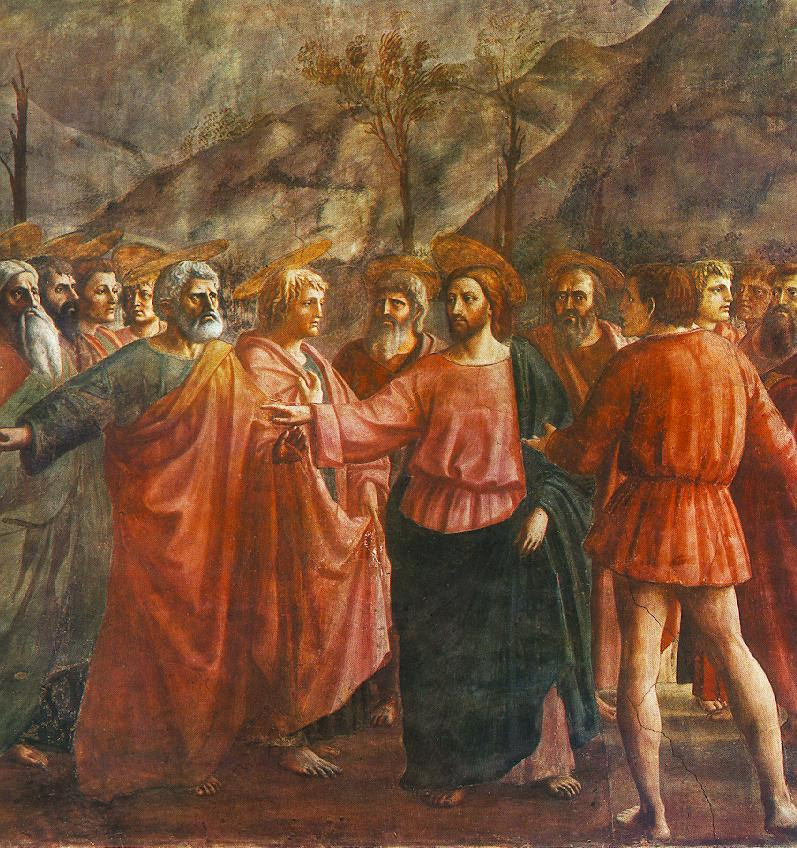
Tribute Money: Christ with the disciples, pointing to the sea, where the fishing boats are docked
Money
Money, inasmuch as it possesses the property of being able to buy
everything and appropriate all objects, is the object most worth possessing.
The universality of this property is the basis of money's omnipotence;
hence, it is regarded as an omnipotent being... Money is the pimp between
need and object, between life and man's means of life. But that which mediates
my life also mediates the existence of other men for me. It is for
me the other person.
What, man! confound it, hands and feet
And head and backside, all are yours!
And what we take while life is sweet,
Is that to be declared not ours?
And head and backside, all are yours!
And what we take while life is sweet,
Is that to be declared not ours?
Six stallions, say, I can afford,
Is not their strength my property?
I tear along, a sporting lord,
As if their legs belonged to me.
Is not their strength my property?
I tear along, a sporting lord,
As if their legs belonged to me.
(Goethe, Faust – Mephistopheles)
[ Part I, scene 4 ]
[ Part I, scene 4 ]
Shakespeare, in Timon of Athens:
Gold? Yellow, glittering, precious gold! No, gods,
I am no idle votarist; roots, you clear heavens!
Thus much of this will make black, white; foul, fair;
Wrong, right; base, noble; old, young; coward, valiant.
... Why, this
Will lug your priests and servants from your sides;
Pluck stout men's pillows from below their heads:
This yellow slave
Will knit and break religions; bless th'accurst;
Make the hoar leprosy adored; place thieves,
And give them title, knee, and approbation,
With senators on the bench: this is it
That makes the wappen'd widow wed again;
She whom the spital-house and ulcerous sores
Would cast the gorge at, this embalms and spices
To th'April day again. Come, damned earth,
Thou common whore of mankind, that putt'st odds
Among the rout of nations, I will make thee
Do thy right nature.
I am no idle votarist; roots, you clear heavens!
Thus much of this will make black, white; foul, fair;
Wrong, right; base, noble; old, young; coward, valiant.
... Why, this
Will lug your priests and servants from your sides;
Pluck stout men's pillows from below their heads:
This yellow slave
Will knit and break religions; bless th'accurst;
Make the hoar leprosy adored; place thieves,
And give them title, knee, and approbation,
With senators on the bench: this is it
That makes the wappen'd widow wed again;
She whom the spital-house and ulcerous sores
Would cast the gorge at, this embalms and spices
To th'April day again. Come, damned earth,
Thou common whore of mankind, that putt'st odds
Among the rout of nations, I will make thee
Do thy right nature.
And, later on:
O thou sweet king-killer, and dear divorce
'Twixt natural son and sire! Thou bright defiler
Of Hymen's purest bed! Thou valiant Mars!
Thou ever young, fresh, loved and delicate wooer,
Whose blush doth thaw the consecrated snow
That lies on Dian's lap! Thou visible god,
That solder'st close impossibilities,
And mak'st them kiss! That speak'st with every tongue,
To every purpose! O thou touch of hearts!
Think, thy slave man rebels; and by thy virtue
Set them into confounding odds, that beasts
May have in world empire!
'Twixt natural son and sire! Thou bright defiler
Of Hymen's purest bed! Thou valiant Mars!
Thou ever young, fresh, loved and delicate wooer,
Whose blush doth thaw the consecrated snow
That lies on Dian's lap! Thou visible god,
That solder'st close impossibilities,
And mak'st them kiss! That speak'st with every tongue,
To every purpose! O thou touch of hearts!
Think, thy slave man rebels; and by thy virtue
Set them into confounding odds, that beasts
May have in world empire!
Shakespeare paints a brilliant picture of the nature of money. To understand
him, let us begin by expounding the passage from Goethe.
That which exists for me through the medium of money, that which
I can pay for, i.e., that which money can buy, that am I, the possessor
of money. The stronger the power of my money, the stronger am I. The properties
of money are my, the possessor's, properties and essential powers. Therefore,
what I am and what I can do is by no means determined by my individuality.
I am ugly, but I can buy the most beautiful woman. Which means to say that
I am not ugly, for the effect of ugliness, its repelling power, is destroyed
by money. As an individual, I am lame, but money procures me 24 legs. Consequently,
I am not lame. I am a wicked, dishonest, unscrupulous and stupid individual,
but money is respected, and so also is its owner. Money is the highest
good, and consequently its owner is also good. Moreover, money spares me
the trouble of being dishonest, and I am therefore presumed to be honest.
I am mindless, but if money is the true mind of all things, how can its
owner be mindless? What is more, he can buy clever people for himself,
and is not he who has power over clever people cleverer than them? Through
money, I can have anything the human heart desires. Do I not possess all
human abilities? Does not money therefore transform all my incapacities
into their opposite?
If money is the bond which ties me to human life and society to me, which links me to nature and to man, is money not the bond of all bonds? Can it not bind and loose all bonds? Is it therefore not the universal means of separation? It is the true agent of separation and the true cementing agent, it is the chemical power of society.
Shakespeare brings out two properties of money in particular:
(1) It is the visible divinity, the transformation of all
human and natural qualities into their opposites, the universal confusion
and inversion of things; it brings together impossibilities.
(2) It is the universal whore, the universal pimp of men
and peoples.
The inversion and confusion of all human and natural qualities,
the bringing together of impossibilities, the divine power of money lies
in its nature as the estranged and alienating species-essence of man which
alienates itself by selling itself. It is the alienated capacity of mankind.
What I, as a man, do -- i.e., what all my individual powers
cannot do -- I can do with the help of money. Money, therefore, transforms
each of these essential powers into something which it is not, into its
opposite.
If I desire a meal, or want to take the mail coach because I am
not strong enough to make the journey on foot, money can provide me both
the meal and the mail coach – i.e., it transfers my wishes from
the realm of imagination, it translates them from their existence as thought,
imagination, and desires, into their sensuous, real existence, from imagination
into life, and from imagined being into real being. In this mediating role,
money is the truly creative power.
Demand also exists for those who have no money, but their demand
is simply a figment of the imagination. For me, or for any other third
party, it has no effect, no existence. For me, it therefore remains unreal
and without an object. The difference between effective demand based on
money and ineffective demand based on my need, my passion, my desire, etc.,
is the difference between being and thinking, between a representation
which merely exists within me and one which exists outside me as a real
object.
If I have money for travel, I have no need -- i.e., no
real and self-realizing need -- to travel. If I have a vocation to study,
but no money for it, I have no vocation to study -- i.e.,
no real, true vocation. But, if I really do not have any vocation to study,
but have the will and the money, then I have an effective vocation
do to so. Money, which is the external, universal means and power -- derived
not from man as man, and not from human society as society -- to turn imagination
into reality and reality into more imagination, similarly turns real human
and natural powers into purely abstract representations, and therefore
imperfections and phantoms – truly impotent powers which exist only in
the individual's fantasy – into real essential powers and abilities. Thus
characterized, money is the universal inversion of individualities, which
it turns into their opposites and to whose qualities it attaches contradictory
qualities.
Money, therefore, appears as an inverting power in relation
to the individual and to those social and other bonds which claim to be
essences in themselves. It transforms loyalty into treason, love into hate,
hate into love, virtue into vice, vice into virtue, servant into master,
master into servant, nonsense into reason, and reason into nonsense.
Since money, as the existing and active concept of value, confounds
and exchanges everything, it is the universal confusion and exchange
of all things, an inverted world, the confusion and exchange of all natural
and human qualities.
He who can buy courage is brave, even if he is a coward. Money
is not exchange for a particular quality, a particular thing, or for any
particular one of the essential powers of man, but for the whole objective
world of man and of nature. Seen from the standpoint of the person who
possesses it, money exchanges every quality for every other quality and
object, even if it is contradictory; it is the power which brings together
impossibilities and forces contradictions to embrace.
If we assume man to be man, and his relation to the world to be
a human one, then love can be exchanged only for love, trust for trust,
and so on. If you wish to enjoy art, you must be an artistically educated
person; if you wish to exercise influence on other men, you must be the
sort of person who has a truly stimulating and encouraging effect on others.
Each one of your relations to man -- and to nature -- must be a particular
expression, corresponding to the object of your will, of your real individual
life. If you love unrequitedly -- i.e., if your love as love does
not call forth love in return, if, through the vital expression of yourself
as a loving person, you fail to become a loved person -- then your love
is impotent, it is a misfortune.
Karl Marx: from Money, in Economic and Philosophic Manuscripts of 1844, translated by Gregor Benton, 1974

$$$ wallpaper 02 (Florence): photo by Prof Alex O Chevtchenko, 26 December 2013
The Bank of Japan announced an open-ended asset
purchase program in January 2013 and an unexpectedly ramped-up version of the
program was implemented in early April. Market
commentary at that time suggested that flooding the economy with liquidity
would lead to a “wall of money” flowing out of Japan in search of higher yields,
affecting asset prices worldwide. So far, however, Japan’s wall of money remains missing in action, with no pickup in
Japanese foreign investment since the April policy shift. Why is this?
from Japan's Missing Wall of Money: Thomas Klitgaard, in Liberty Street Economics, blog of the Federal Reserve Bank of New York, 4 November 2013
from Japan's Missing Wall of Money: Thomas Klitgaard, in Liberty Street Economics, blog of the Federal Reserve Bank of New York, 4 November 2013

$$$ wallpaper (Florence): photo by Prof Alex O Chevtchenko, 26 December 2013
In the work I did for the exhibition “Art, Price and Value”, at
Palazzo Strozzi in Florence, the destructive action on the banknote
was accompanied by a different practice that I have been trying out in
recent years: that of the free distribution of works. Displayed on a
wall
measuring 9 metres by 3 were 3,000 low denomination dollar notes,
which I had treated individually with sulphuric acid. Every visitor
could choose a banknote, detach it from the wall and take it away.
The idea that the aesthetic synthesis, represented by the united composition of 3,000 banknotes, can be corroded, piece after piece, until it is literally emptied, calls into question the work of art as an unchangeable museum piece, offered to the public’s fetishist contemplation. In a way, it is a second “destructive” level: after the attack on the banknote, the attack on the work. At the same time, however, the act of destruction also represents a multiplication of the work itself. That installation can no longer be held in a museum, while it can be carried in the pockets of 3,000 people. I’m not saying that a piece of a painting by Pollock should be taken away every time someone goes to the MoMA. I do think, though, that this work can express an alternative function to that of contemplation.
-- Cesare Pietroiusti: from Francesca Picchi: Methods for an irreversible alteration of money: An interview with Cesare Pietroiusti, in Domus, 18 February 2009
The idea that the aesthetic synthesis, represented by the united composition of 3,000 banknotes, can be corroded, piece after piece, until it is literally emptied, calls into question the work of art as an unchangeable museum piece, offered to the public’s fetishist contemplation. In a way, it is a second “destructive” level: after the attack on the banknote, the attack on the work. At the same time, however, the act of destruction also represents a multiplication of the work itself. That installation can no longer be held in a museum, while it can be carried in the pockets of 3,000 people. I’m not saying that a piece of a painting by Pollock should be taken away every time someone goes to the MoMA. I do think, though, that this work can express an alternative function to that of contemplation.
-- Cesare Pietroiusti: from Francesca Picchi: Methods for an irreversible alteration of money: An interview with Cesare Pietroiusti, in Domus, 18 February 2009
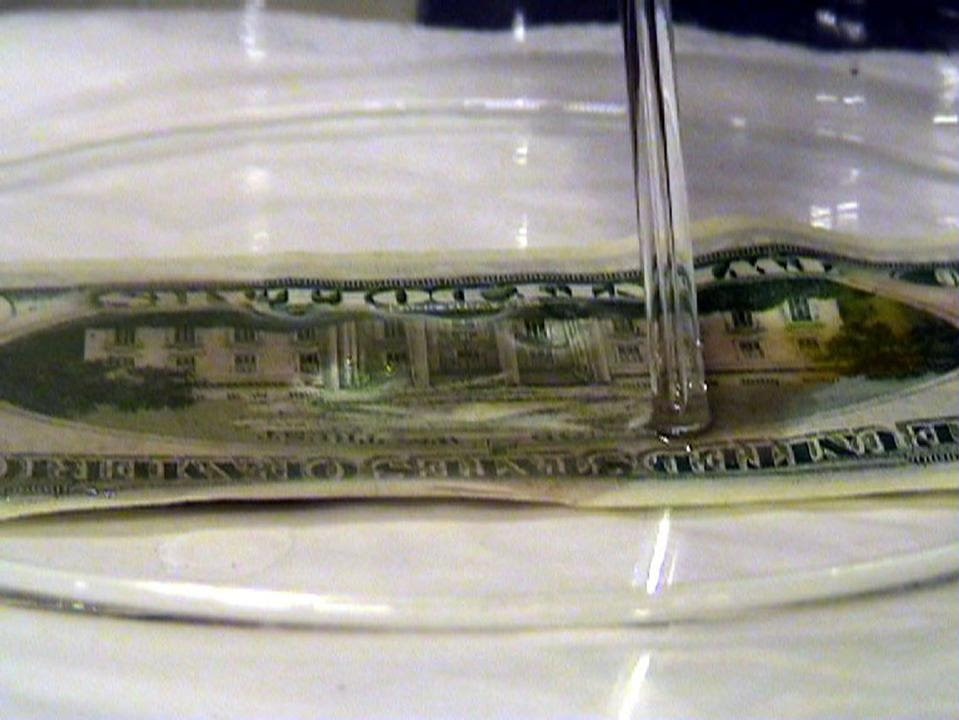
Chemical "preparation" of a banknote: photographer unknown, from Francesca Picchi: Methods for an irreversible alteration of money: An interview with Cesare Pietroiusti, in Domus, 18 February 2009
The
Middle Ages also had practical questions about money. Whose is the
money? What is it for? The questions became particularly acute with the
defaults and debasements in England and France to finance their long war
in the fourteenth century: Edward III defaulted on his Italian loans
while his adversary used the mints as a form of taxation: the silver
substituted by alloy became an additional revenue or seignorage. These
monetary debasements were disastrous to those living on incomes fixed in money, such as absentee landlords and rentiers, but a boon to those who could pay their debts in the debased coin, such as the poor and above all the crown: these grandes alliances have been at it ever since. Oresme, writing in the middle of the fourteenth century, sets
out the terms of this super-secular struggle with admirable clarity;
but, in truth, there is no common psychological ground between the
adversaries. As a bishop and a landlord, Oresme comes down decisively on
the side of hard money: money, he says, is not the property of the
prince but of the community which uses it; and he argues, threateningly,
that princes that abuse their money will lose their kingdoms.
It is fascinating to behold. Just at the moment when princes, through their control of money, gain the upper hand over their feudatories, so they fall prey to the bankers, who, murdered or mulcted or bankrupted by monarchs, will lend to them only at rates that incorporate those rather substantial risks. The advanced cites of Italy, such as Genoa and Florence, had already alienated themselves to their bankers, a process made manifest in Florence by the Medici dictatorship; while Machiavelli thought the creditors of Genoa, collected in the House of St George, should have taken over the whole city...
Marx, worrying away at the nature of money in Rue Vaneau in Paris in the spring of 1844, was deeply skeptical about the liberty embodied in the use of money. For him, the rootless lord, insubordinate vassal and emancipated serf are now subject to a set of autonomous and superhuman relations, the rule of money: 'The medieval proverb nulle terre sans seigneur [there is no land without its master] is thereby replaced by that other proverb, l'argent n'a pas de maître [Money knows no master] which suggests the complete domination of living man by dead matter.' He saw money as the successor of medieval religion, as an amalgam of human fear and desire estranged from its originator and granted dominion over him: truly, a mortgaged crown of thorns. He sought to restore not religion, but humanity. He revived the medieval notion of the just price, appealing not to a divine standard but to a human: the real value of anything was the volume of human effort and misery that had gone into its making.
Marx, unfortunately, was no saint, and it is given only to saints to see into the nature of money: to look into its bland exterior, its absolute refusal to divulge its history in transaction, and unlock it from a merciless nature. Toward the end of the fifteenth century, St Francis of Paola attempted to restore the corrupted Franciscan teaching in a regime of extreme austerity and a total renunciation of money. Travelling through Naples, he was offered a bag of gold for his expenses by King Ferdinand I. He refused it because, he said, it was the price of the blood of the King's subjects. 'To prove it, he took one of the gold pieces and broke it in two, whereupon several drops of blood fell from the money.'
.
With
the feudal system in ruins, there arose a spirited debate in the most
advanced city in Europe, Florence, as to what actually constituted
strength in the state: money or men. Machiavelli argued that anybody
with soldiers could obtain money. He was contradicted flatly by his
friend Francesco Guicciardini, whose nephew, Lodovico, helped make
proverbial a comment of the condottiere Gian Giacomo di
Trivulzio: asked by Louis II in 1499 what was needed to capture Milan,
the great mercenary said: Money, money and once again money.
The dispute was, in reality, a first attempt to come to grips with the oppositions of capital and labour in the department then of greatest interest to states, the strategic.
James Buchan: from Frozen Desire: The Meaning of Money, 1993
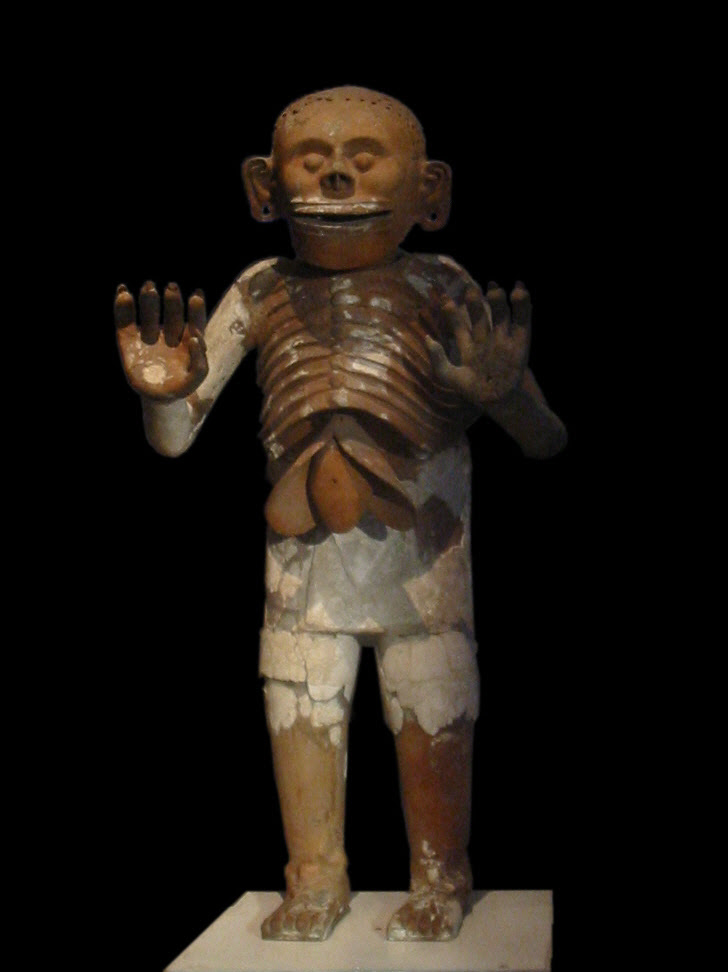
Mictlantecuhtli, god of the dead and king of Mictlan (Chicunauhmictlan), lowest and northernmost section of the underworld: Aztec, sculptor unknown, recovered during excavation of the House of Eagles in the Templo Mayor: photo by Thelmadatter, 23 March 2008 (Museum of the Templo Mayor, Mexico City
Looking back from the present, it cannot be denied that western capitalism in the long run created a new art of living, new ways of thinking: it developed side by side with them. Can one call this a new civilization? That would I think be putting it too strongly: a civilization is built up over a longer time scale.
But if change there was, when did it come? ... Werner Sombart locates it in fifteenth-century Florence.
There is no doubt in my mind: on this point Sombart is right... Thirteenth-century -- and a fortiori fourteenth-century Florence was a capitalist city, whatever meaning one attaches to the word. The precocious and abnormal picture it presented struck Sombart, quite understandably... Leon Battista Alberti (1404-1472), architect, sculptor, humanist, was the scion of a long-powerful family with an eventful history: members of the Alberti family had economically colonized England in the fourteenth century; indeed so ubiquitous were they that the English documents often refer to them as the Albertynes -- as if like the Lucchese or indeed the Florentines, they were a nation in themselves. Leon Battista spent many years in exile and with the intention of escaping the troubles of the world entered holy orders. He wrote the first of three Libri della Famiglia in Rome, in about 1433-1434; the fourth was completed in Florence in 1441. Sombart finds in these books a new climate: praise of money, recognition of the value of time, the need to live thriftily -- all good bourgeois principles in the first flush of their youth. And the fact that this cleric came from a long line of merchants respected for their good faith lent weight to his writings. Money is 'the root of all things'; 'with money, one can have a house or a villa, and all the trades and craftsmen will toil like servants for the man who has money. He who has none goes without everything, and money is required for every purpose.' This was a new attitude towards wealth: previously it had been regarded as a kind of obstacle to salvation. The same was true of time: in the past, time had been considered as belonging to God alone; to sell it (in the shape of interest) was to sell non suum, what did not belong to one. But now time was once more becoming a dimension of human life, one of man's possessions which he would do well not to waste. And there was a new approach to luxury: 'Always remember, my sons', writes Alberti, 'that your expenditure should never exceed your income' -- a new rule which condemned the conspicuous luxury of the nobles. As Sombart says, 'this was introducing a spirit of thrift not into the wretched domestic budgets of humble people who could hardly get enough to eat but into the mansions of the rich'. In other words, the spirit of capitalism.
Fernand Braudel: from The Wheels of Commerce (Les jeux de l'echange), 1979, Volume 2 of Civilization and Capitalism, 15th-18th century (Civilisation materielle, économie et capitalisme); translated from the French by Sîan Reynolds, 1982

For the Love of God: sculpture by Damien Hirst, 2007, platinum cast of a human skull covered with 8,601 diamonds; displayed at White Cube Gallery, London, asking price 50 million pounds: photographer unknown (via Daily Telegraph)
... the desire incarnate in money offered a reward to the imagination,
as between two lovers; and that reward seemed at first to be guaranteed
by rare and beautiful metals, of whose inner nature and capacity men
could only dream. In time, that guarantee was unveiled as only the
projected authority of a community... It was the community that
authorised the wishes expressed in money or frustrated them. To use
money was to submit to the state, and when states disintegrated their
moneys vanished as completely as their laws...
James Buchan: from Frozen Desire: The Meaning of Money, 1993

Máscara de Xiuhtecuhtli: representation of Xiuhtecuhtli (Lord Turquoise), Central Mexican god of fire: Mixtec-Aztec, c. 1400-1521, mosaic of turquoise inlay and other materials; photo by Manuel Parada López de Corselas, 2007 (British Museum, London)

Mictlantecuhtli, god of the dead: Aztec, sculptor unknown; photo by Jamie Dwyer, 19 August 2008 (Museum of the Templo Mayor, Mexico City)

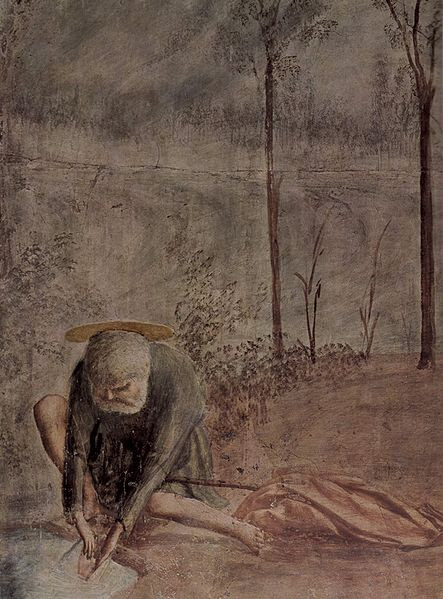
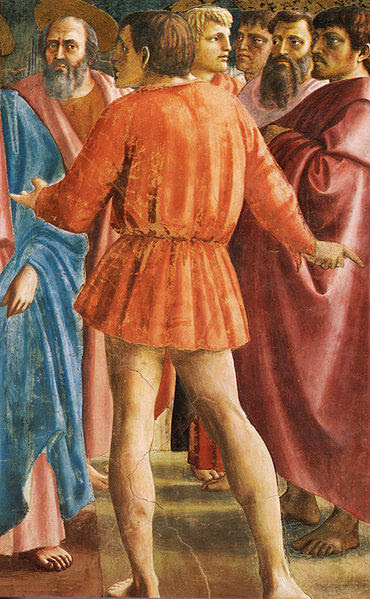



5 comments:
A remarkable post - moving from the Masaccio to Marx.
Money is the pimp between need and object, between life and man's means of life.
And from Hirst's vulgar bit of tribute to the head of Lord Turquoise.
Every time I'd visit London as a child, I would look at that head if it were on show: all the dread and wonder comes back.
The bond of all bonds is right.
Thank you. This is excellent.
wow. thought of this post as my friend refused to let me pay for drinks.no need to read newspapers, you've got it all down. beautiful.
Someone has characterized capital as dead labor: the expropriated energy of human beings, skimmed off by the few using any and all means, including force and violence. Converted into “wealth” and “assets,” it dies, this energy—becomes matter, “money,” things we believe we “own.”
One prototype for modern capital is found in the classical Greek world, a period we often understand wrongly and incompletely; but which we Western civ types revere for supposedly giving us the fundamentals of democracy. Even back then “democracy” was for the few. People, including women and children, were chattel, their lives at the mercy of the paterfamilias; slavery was “fundamental” to the economy. Greek thought of the time regarded physical survival as a bothersome reality; all human beings were “subject to necessity.” But a man (and it was only men, and only a few) could free himself from this burden of needs by forcing others, whether as slaves or as wage laborers, to do his work for him, so that he might be at liberty to participate in running the city-states where these malignant ideas took root. This was the only life worthy of living. Governance by these “free men” was tantamount to gaming the system for oneself and one’s class.
It’s one thing to get it wrong. To be wrong for thousands of years takes it to another level.
Have dwelt upon these thoughts the past few nights. And dwelt some more.
Greater minds have shipwrecked on those rocks before.
But who am I to speak of such things. I've never even owned a credit card.
Nor a mobile device, which must be why it's not ringing off the proverbial hook right now with incoming commissions from the Marchese.
"...seeth no man Gonzaga...": Andrea Mantegna: The Court of Gonzaga / Ezra Pound: from Canto XLV
Post a Comment